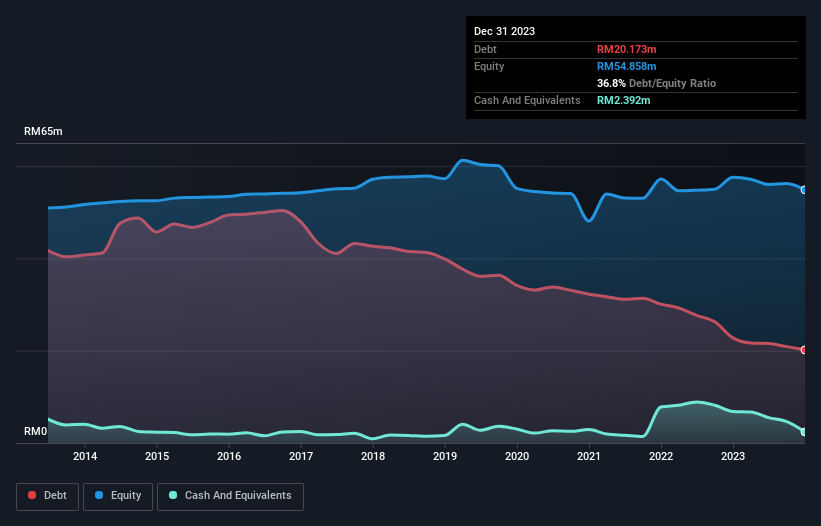Stock Analysis

The external fund manager backed by Berkshire Hathaway's Charlie Munger, Li Lu, makes no bones about it when he says 'The biggest investment risk is not the volatility of prices, but whether you will suffer a permanent loss of capital.' When we think about how risky a company is, we always like to look at its use of debt, since debt overload can lead to ruin. We can see that DFCITY Group Berhad (KLSE:DFCITY) does use debt in its business. But should shareholders be worried about its use of debt?
When Is Debt Dangerous?
Debt and other liabilities become risky for a business when it cannot easily fulfill those obligations, either with free cash flow or by raising capital at an attractive price. Ultimately, if the company can't fulfill its legal obligations to repay debt, shareholders could walk away with nothing. However, a more frequent (but still costly) occurrence is where a company must issue shares at bargain-basement prices, permanently diluting shareholders, just to shore up its balance sheet. By replacing dilution, though, debt can be an extremely good tool for businesses that need capital to invest in growth at high rates of return. When we think about a company's use of debt, we first look at cash and debt together.
Check out our latest analysis for DFCITY Group Berhad
What Is DFCITY Group Berhad's Debt?
The image below, which you can click on for greater detail, shows that DFCITY Group Berhad had debt of RM20.2m at the end of December 2023, a reduction from RM22.8m over a year. However, it also had RM2.39m in cash, and so its net debt is RM17.8m.

A Look At DFCITY Group Berhad's Liabilities
Zooming in on the latest balance sheet data, we can see that DFCITY Group Berhad had liabilities of RM22.6m due within 12 months and liabilities of RM10.4m due beyond that. On the other hand, it had cash of RM2.39m and RM6.69m worth of receivables due within a year. So it has liabilities totalling RM23.9m more than its cash and near-term receivables, combined.
This deficit is considerable relative to its market capitalization of RM34.8m, so it does suggest shareholders should keep an eye on DFCITY Group Berhad's use of debt. This suggests shareholders would be heavily diluted if the company needed to shore up its balance sheet in a hurry. There's no doubt that we learn most about debt from the balance sheet. But it is DFCITY Group Berhad's earnings that will influence how the balance sheet holds up in the future. So if you're keen to discover more about its earnings, it might be worth checking out this graph of its long term earnings trend.
Over 12 months, DFCITY Group Berhad made a loss at the EBIT level, and saw its revenue drop to RM13m, which is a fall of 41%. That makes us nervous, to say the least.
Caveat Emptor
While DFCITY Group Berhad's falling revenue is about as heartwarming as a wet blanket, arguably its earnings before interest and tax (EBIT) loss is even less appealing. Indeed, it lost RM1.2m at the EBIT level. Considering that alongside the liabilities mentioned above does not give us much confidence that company should be using so much debt. Quite frankly we think the balance sheet is far from match-fit, although it could be improved with time. However, it doesn't help that it burned through RM1.7m of cash over the last year. So suffice it to say we do consider the stock to be risky. When analysing debt levels, the balance sheet is the obvious place to start. However, not all investment risk resides within the balance sheet - far from it. For example DFCITY Group Berhad has 3 warning signs (and 2 which are a bit unpleasant) we think you should know about.
At the end of the day, it's often better to focus on companies that are free from net debt. You can access our special list of such companies (all with a track record of profit growth). It's free.
Valuation is complex, but we're helping make it simple.
Find out whether DFCITY Group Berhad is potentially over or undervalued by checking out our comprehensive analysis, which includes fair value estimates, risks and warnings, dividends, insider transactions and financial health.
View the Free AnalysisHave feedback on this article? Concerned about the content? Get in touch with us directly. Alternatively, email editorial-team (at) simplywallst.com.
This article by Simply Wall St is general in nature. We provide commentary based on historical data and analyst forecasts only using an unbiased methodology and our articles are not intended to be financial advice. It does not constitute a recommendation to buy or sell any stock, and does not take account of your objectives, or your financial situation. We aim to bring you long-term focused analysis driven by fundamental data. Note that our analysis may not factor in the latest price-sensitive company announcements or qualitative material. Simply Wall St has no position in any stocks mentioned.
About KLSE:DFCITY
DFCITY Group Berhad
DFCITY Group Berhad, an investment holding company, manufactures and sells dimension stones and related products primarily in Indonesia, Malaysia, and the United States.
Flawless balance sheet with weak fundamentals.

